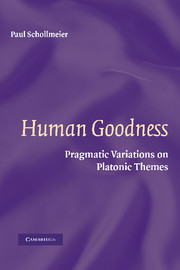3 - Human Happiness
Published online by Cambridge University Press: 28 July 2009
Summary
1. The familiar countenance in your mirror, when you gaze upon it, have you ever pondered the question, What am I? Perhaps, after a late glass of whisky, we all have on one occasion or another. I do not mean to ask, Who am I? We are each obviously so-and-so who lives at such-and-such an address. But I do mean to ask, What am I? What is a human being? What is the nature of this creature whose mercurial image now floats before my eyes? Surely, this question occurs to everyone in those anomalous moments when we slip out of our routine.
No one, I am afraid, can truly answer this inordinate question, not even after a sip or two of good scotch. We are all destined inexorably to fail in our attempts to cogitate our own essence, despite our best efforts to obey the injunction of Delphic oracle. Why are we so destined? Obviously, we cannot presume to any divine knowledge of what we are. If he taught anything, Socrates surely taught us that we are incapable of aspiring to knowledge of any truth, true once and for all. He thought the mere presumption to knowledge of this kind to be the height of human folly.
Can we not have human knowledge of ourselves? you may ask. I concede that we can. But our knowledge consists of tenets all too tentative.
- Type
- Chapter
- Information
- Human GoodnessPragmatic Variations on Platonic Themes, pp. 68 - 113Publisher: Cambridge University PressPrint publication year: 2006



